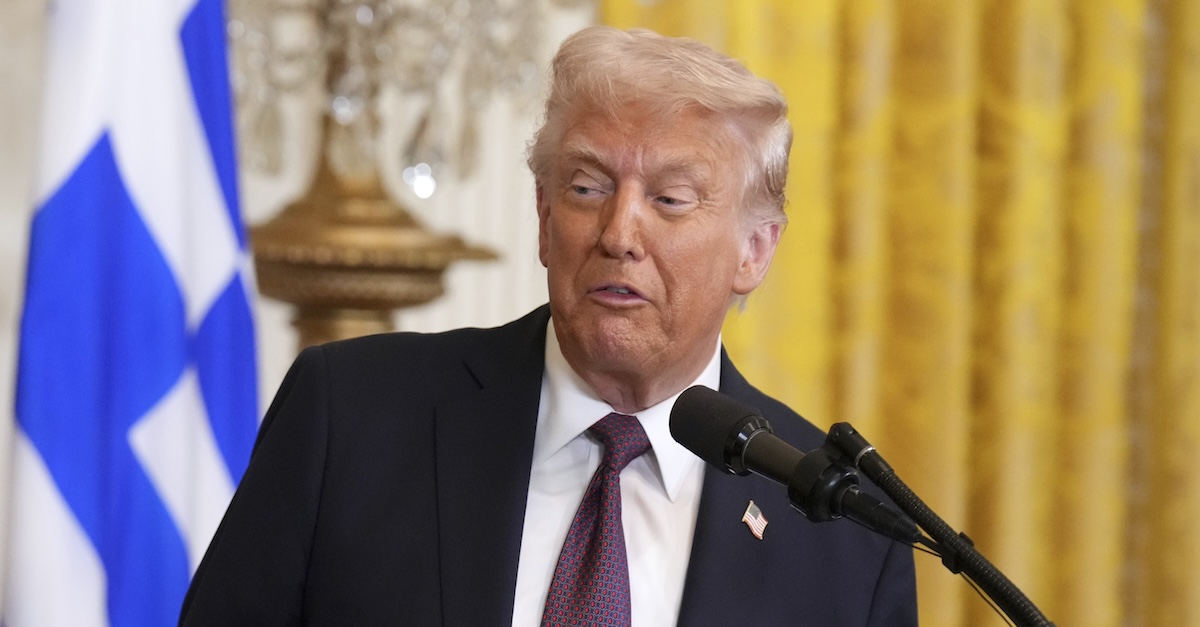Share this @internewscast.com

President Donald Trump delivers remarks at a reception celebrating Greek Independence Day in the East Room of the White House, Monday, March 24, 2025, in Washington (AP Photo/Jacquelyn Martin).
Multiple states that have, up to this point, prevented the Trump administration from implementing its announced plans to prohibit birthright citizenship are urging the U.S. Supreme Court to maintain that stance.
In a 50-page rebuttal to the Trump administration’s request for a partial stay, the principal plaintiffs in one of three parallel efforts to block the ban assert that the legal status is well-established and clear, and that there is “not an emergency warranting the extraordinary remedy of a stay.”
“Many aspects of constitutional interpretation are hotly debated, but not the merits question in this case,” the Friday motion reads. “For over a century, it has been the settled view of this Court, Congress, the Executive Branch, and legal scholars that the Fourteenth Amendment’s Citizenship Clause guarantees citizenship to babies born in the United States regardless of their parents’ citizenship, ‘allegiance,’ ‘domicile,’ immigration status, or nationality.”
In Maryland, Washington and Massachusetts, federal judges have issued orders prohibiting federal agencies from implementing or enforcing Trump’s Executive Order 14160.
While the government asked the high court to undo each of the three separate pauses in the same application, each of those three cases is docketed individually — and consecutively. The likely upshot, however, is each case being consolidated into the same general controversy — if and when the justices decide to hear oral arguments.
The Trump administration’s appeal largely eschews the merits of the underlying birthright citizenship policy in favor of fighting over the propriety of the district court injunctions stopping the ban.
The plaintiffs in the case stylized as Trump v. Washington suggest a certain level of laziness because the government’s effort bypasses the merits discussed by the district courts in favor of a “myopic request” that “instead focuses entirely on the scope of relief.”
“Unsurprisingly, every court to evaluate the Citizen Stripping Order has found it unconstitutional,” the motion continues. “And the stay application does not even bother asking this Court to review those correct conclusions.”
Even on the Trump administration’s terms, however, the plaintiffs say there is simply no reason for dissolving the lower court orders.
“Most obviously, the federal government can show no harm from simply being ordered to continue following the law as it has long been understood,” the motion goes on. “Preserving the status quo while this litigation rapidly proceeds cannot plausibly be an irreparable injury, and this Court can deny the stay on this ground alone.”
The plaintiffs rubbish the government for arguing they have and will continue to suffer “irreparable harm” from extant and prospective “universal injunctions.” Especially because this theory is only advanced in general terms, the response motion notes.
“The federal government alleges various harms from overbroad injunctions generally, but offers no evidence whatsoever of irreparable harm from the specific injunctions at issue here,” the motion reads. “And with good reason. There is no plausible argument that the government will be irreparably harmed by continuing to respect a foundational constitutional right that has been established—and accepted by all branches of the federal government—for more than a century.”
In fact, the states predict the procedural gambit will be summarily rejected. A chapter heading in the motion is titled, “There Is No Reasonable Probability that this Court Will Grant Certiorari or Fair Prospect of Reversal.”
“The Fourteenth Amendment’s plain text guarantees citizenship to all born in the United States and subject to the jurisdiction thereof,” the motion reads. “The Citizenship Clause is broad by design, bestowing citizenship on children born in the United States regardless of race, ethnicity, alienage, or the immigration status of one’s parents. Binding precedent confirms that understanding,”
The motion continues like this, at length:
The federal government seeks to distort the term “subject to the jurisdiction” beyond all recognizable bounds. But as a matter of text, history, and precedent, the group of U.S.-born individuals not subject to the jurisdiction of the United States is both extraordinarily small and well defined. As this Court held in Wong Kim Ark, that phrase reflects a narrow and historically grounded exception for groups recognized as exempt from the United States’ jurisdiction as a matter of fact, comity, or practice. In particular, it excludes U.S.-born children who are born to diplomats covered by diplomatic immunity and members of foreign armies at war against the United States. It has never been understood to exclude U.S.-born children based on their parents’ citizenship, immigration status, “allegiance,” or “domicile,” and indeed, the federal government does not point to a single binding case that accepts its strained theory.
The Washington response motion also briefly addresses the Trump administration’s arguments about nationwide injunctions to heart. The motion acknowledges that such relief has increased apace in recent years but stressing that nationwide injunctions do, in fact, have a time and a place.
“The Citizenship Stripping Order shows precisely why nationwide relief is critical in an extraordinary case like this one,” the motion goes on. “Restricting nationwide relief would be particularly inappropriate here, as it would defeat a central guarantee of the Fourteenth Amendment to create a uniform, national rule for citizenship. If any injunction warranted a nationwide scope, it is this one.”
Washington strongly admonishes the government for trying to litigate the injunction issue using the birthright citizenship cases.
The motion concludes:
The Citizenship Stripping Order’s attempt to unilaterally amend the Fourteenth Amendment warrants an injunction that preserves the guarantee of birthright citizenship as it has long existed: A uniform right that applies nationwide and is beyond the President’s power to destroy. The federal government has failed to establish any of the criteria necessary to get the extraordinary relief they seek and have not come close to meeting their “especially heavy burden.” These cases are proceeding on expedited schedules in three different courts of appeals—all of which have denied the federal government this very same intervention. The federal government has not shown irreparable harm or a reasonable probability the Court would grant certiorari and reverse the district court’s order. This case is not a vehicle to resolve the question of nationwide injunctions. And the public interest weighs heavily against granting a stay. The Application should be denied.
Love true crime? Sign up for our newsletter, The Law&Crime Docket, to get the latest real-life crime stories delivered right to your inbox.

















